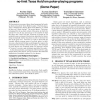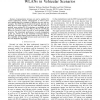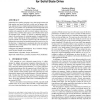61 search results - page 6 / 13 » Speeding up gradient-based algorithms for sequential games |
ATAL
2008
Springer
15 years 1 months ago
2008
Springer
We demonstrate two game theory-based programs for headsup limit and no-limit Texas Hold'em poker. The first player, GS3, is designed for playing limit Texas Hold'em, in ...
VTC
2007
IEEE
15 years 6 months ago
2007
IEEE
—Communication between cars can be exploited for various applications. Security enhancements as well as interactive games played by occupants of different cars are only two examp...
ICIP
2010
IEEE
14 years 9 months ago
2010
IEEE
In this paper, we present a method to speed up video encoding of GPU rendered 3D scenes, which is particularly suited for the efficient and low-delay encoding of 3D game output as...
98
Voted
PDP
2003
IEEE
15 years 5 months ago
2003
IEEE
As general-purpose parallel computers are increasingly being used to speed up different VLSI applications, the development of parallel algorithms for circuit testing, logic minimi...
75
Voted
CIKM
2009
Springer
15 years 4 months ago
2009
Springer
Solid State Drive (SSD), emerging as new data storage media with high random read speed, has been widely used in laptops, desktops, and data servers to replace hard disk during th...



